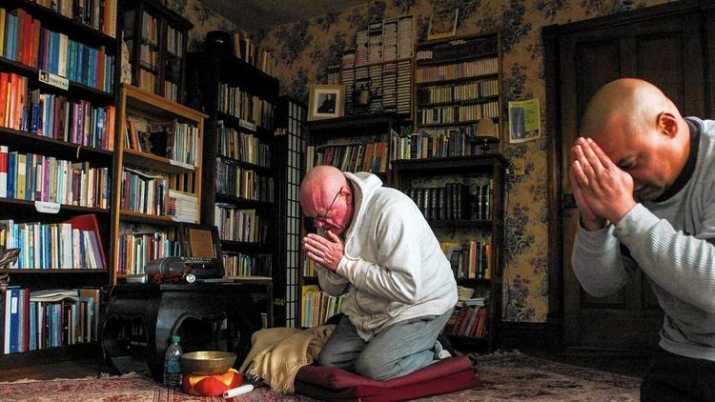NEWS
Buddhist Transitional Community in Pennsylvania Offers Refuge for Former Convicts
 John Mulligan, left, runs Bodhi House, a Buddhist transitional center for ex-cons trying to re-integrate into society. Photo by Shane Dunlap. From mcall.com
John Mulligan, left, runs Bodhi House, a Buddhist transitional center for ex-cons trying to re-integrate into society. Photo by Shane Dunlap. From mcall.comSince 2004, Bodhi House, a transitional living community in rural Adams County in the US state of Pennsylvania, has been offering men exiting the state prison system an opportunity to develop their post-release life skills within a supportive spiritual environment where they can study and practice Buddhism.
The community is run by director John Mulligan, 76, who recognized the lack of post-release options for prisoners practicing Buddhism after years of working within the correction system. Raised a Catholic but now a Theravada Buddhist who studied under teachers in Sri Lanka, Mulligan operates Bodhi House on a shoestring budget, mainly funded by contributions from the four members of its board.
Ulli Klemm, administrator for religion and volunteer services for the Pennsylvania Department of Corrections, recalled that Mulligan, who has worked with the state prison system since the 1990s, was also instrumental in helping to establish Buddhist services within state prisons. “Any issue we have regarding Buddhist services, we can contact John with questions,” he said, estimating that there are 10 or fewer inmates identifying as Buddhists at each of the 27 correctional institutions throughout Pennsylvania. (The Morning Call)
The transition from prison life can be rocky—many employers are reluctant to hire former convicts, and for those who are able to find work, holding down the job requires reliable transportation and a stable place to live. Bodhi House offers to take in such men, many of whom have no family support, providing its residents a respite between prison and the outside world.
One such resident, 42-year-old Angel Correa, who revealed he had done six tours of military duty in Iraq and Afghanistan, said the welding and mechanic skills he acquired before doing time for an unregistered firearms conviction had helped him land a well-paying job nearby. Correa attributed the twice-daily group meditation sessions held at Bodhi House to helping him transition off medication for post-traumatic stress disorder. “I used to go to a therapist twice a month. She saw a huge change from my [medication] intake from when I started practicing Buddhism,” he said. (The Morning Call)
While in prison, Correa decided to try a meditation session offered to inmates by Buddhist volunteers. Soon he was meditating daily and, while still in prison, took Refuge in the Triple Gem—the Buddha, the Dharma, and the Sangha. After arriving at Bodhi House, Correa said he had considered ordaining as a Buddhist monk, and was under the tutelage of Bhante Sujatha, the spiritual director of Bodhi House, who makes frequent visits from the Blue Lotus Temple Buddhist center in Illinois. Correa has since decided against pursing the monastic path, and has been allowed to stay on indefinitely at Bodhi House.
As well as a refuge for transitioning former prisoners, the farmhouse also serves as Mulligan’s home—he lives in one of its five bedrooms. Mulligan noted that one of the great rewards of his work was seeing the men he helps develop a sense of self-worth. “Because they don't believe that themselves; working with them and that transformation is part of what I do in my practice.” (The Morning Call)
The transformation must take place inside, Mulligan observed—a fundamental Buddhist concept that he works to impress upon the men he helps and in his own daily practice, during which he reminds himself of the Buddha’s teachings on the nature of suffering and on acceptance: “This isn’t the way I wanted it, it isn’t what I deserve, it isn’t what I planned, but it is what it is. It’s the Dharma; it’s that which is.”
See more
A Buddhist refuge for those released from prison (The Morning Call)
STATE PRISONS (PA.GOV)














